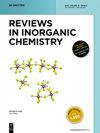综述:评估分析肾结石的方法,研究主要元素和微量元素对结石形成的影响
IF 3.1
3区 化学
Q1 CHEMISTRY, INORGANIC & NUCLEAR
引用次数: 0
摘要
肾结石疾病是一个全球关注的问题,其发病率正在不断上升。本综述旨在全面分析肾结石研究中使用的多种分析技术,并研究主要成分和痕量成分在肾结石形成过程中的重要性。样本包括有机物(尿酸)和无机物(草酸钙和碳酸盐磷灰石)。为了研究 XRD、傅立叶变换红外光谱、扫描电镜和 ICP-MS 等肾结石分析方法,我们进行了系统的文献综述。此外,还研究了肾结石形成过程中主要元素(钙、草酸盐、磷酸盐)和微量元素(镁、锌、铜)的数量及其影响。综述显示,XRD 和傅立叶变换红外光谱最适合评估肾结石的结晶结构和含量,而扫描电镜则能提供丰富的形态学见解。ICP-MS 的痕量元素检测灵敏度使其独树一帜。最常见的草酸钙和磷酸钙会影响肾结石的形成。镁等微量元素可防止结石的形成,而锌和铜则会促进结晶的形成。结果显示,无机成分中的钙含量明显高于有机成分。尿酸结石的元素含量较低,但铜和硒除外,这可能源自肝脏。与草酸钙结石相比,碳酸盐磷灰石结石的元素含量更高,尤其是镁。主成分分析(PCA)确定了三个主成分,解释了 91.91 % 的方差。这些成分反映了元素的特定共沉淀过程,在不同类型的石头中有着不同的分布。结石类型之间元素含量的差异可为患者的饮食考虑提供有价值的指导。本文章由计算机程序翻译,如有差异,请以英文原文为准。
A review: evaluating methods for analyzing kidney stones and investigating the influence of major and trace elements on their formation
Kidney stone disease is a global concern, and its prevalence is increasing. The objective of this review is to provide a thorough analysis of the many analytical techniques used in the study of kidney stones and to investigate the significance of major and trace components in the development of kidney stone formation. The samples included organic (uric acid) and inorganic (calcium oxalate and carbonate apatite). To study kidney stone analysis methods like XRD, FTIR, SEM, and ICP-MS, a systematic literature review was conducted. The quantities and effects of main (calcium, oxalate, phosphate) and trace (magnesium, zinc, copper) elements in kidney stone development were also examined. The review shows that XRD and FTIR are best for evaluating kidney stone crystalline structure and content, whereas SEM gives rich morphological insights. Its trace element detection sensitivity makes ICP-MS unique. Calcium oxalate and calcium phosphate, the most common components, affect kidney stone development. Trace elements like magnesium prevent stone formation, whereas zinc and copper may encourage crystallisation. Results revealed significantly higher calcium levels in inorganic components compared to organic ones. Uric acid stones exhibited lower element content except for copper and selenium, likely originating from the liver. Carbonate apatite stones showed higher element concentrations, particularly magnesium, compared to calcium oxalate stones. Principal component analysis (PCA) identified three principal components, explaining 91.91 % of the variance. These components reflected specific co-precipitation processes of elements, with distinct distributions among different stone types. This variability in element content among stone types could serve as valuable guidance for patient dietary considerations.
求助全文
通过发布文献求助,成功后即可免费获取论文全文。
去求助
来源期刊

Reviews in Inorganic Chemistry
化学-分析化学
CiteScore
7.30
自引率
4.90%
发文量
20
审稿时长
1 months
期刊介绍:
Reviews in Inorganic Chemistry (REVIC) is a quarterly, peer-reviewed journal that focuses on developments in inorganic chemistry. Technical reviews offer detailed synthesis protocols, reviews of methodology and descriptions of apparatus. Topics are treated from a synthetic, theoretical, or analytical perspective. The editors and the publisher are committed to high quality standards and rapid handling of the review and publication process. The journal publishes all aspects of solid-state, molecular and surface chemistry. Topics may be treated from a synthetic, theoretical, or analytical perspective. The editors and the publisher are commited to high quality standards and rapid handling of the review and publication process.
Topics:
-Main group chemistry-
Transition metal chemistry-
Coordination chemistry-
Organometallic chemistry-
Catalysis-
Bioinorganic chemistry-
Supramolecular chemistry-
Ionic liquids
 求助内容:
求助内容: 应助结果提醒方式:
应助结果提醒方式:


